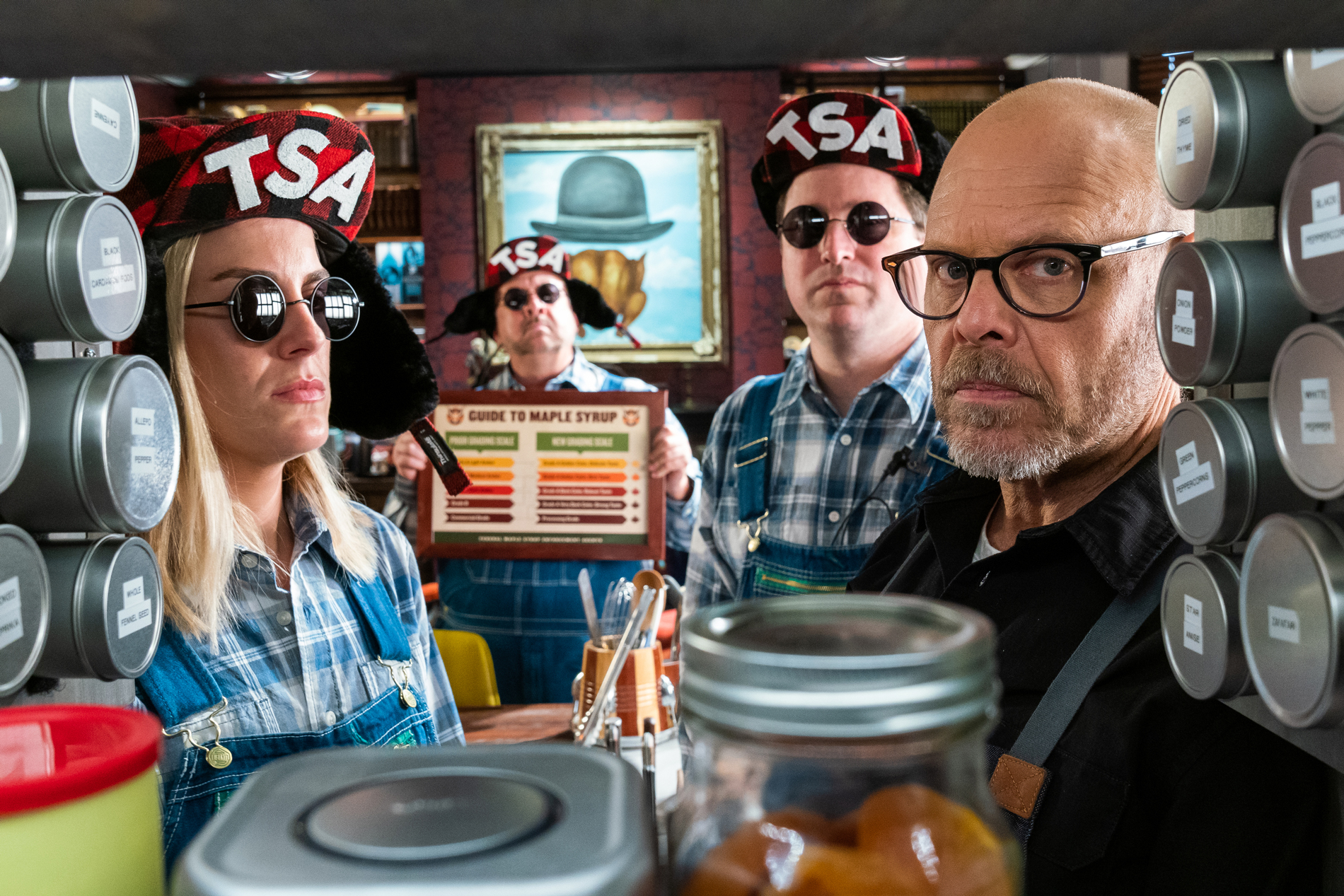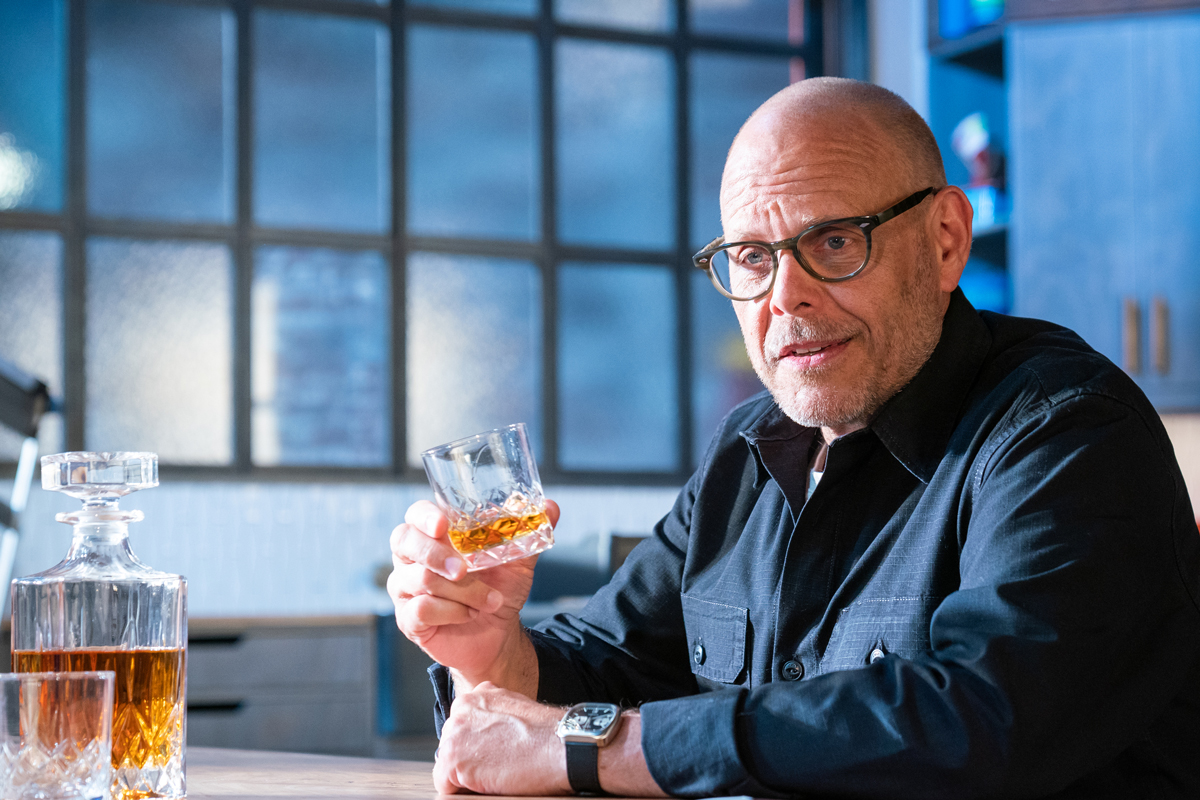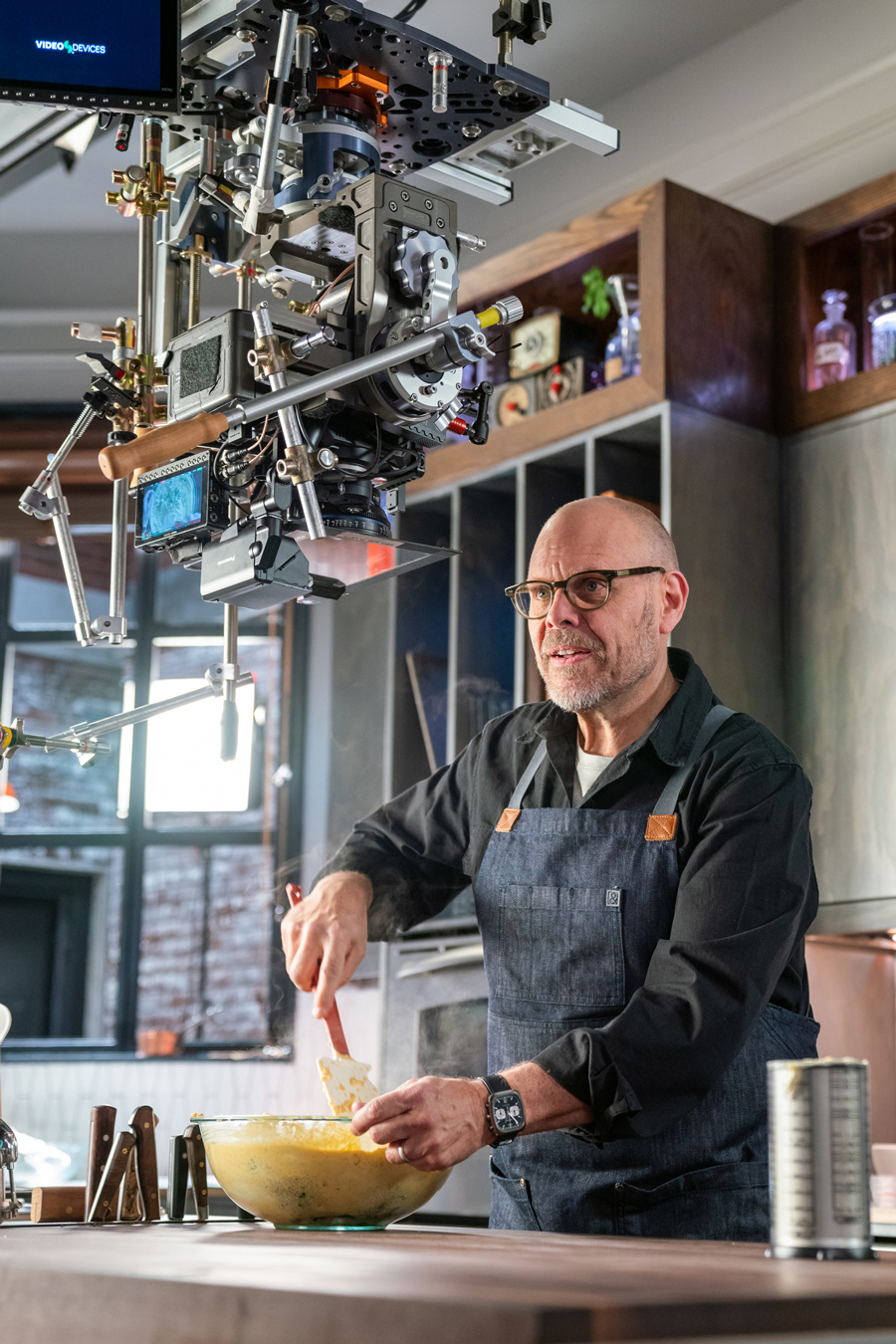
Photograph courtesy of the Food Network
Part cooking program, part classroom, and part community theater show, Good Eats was a game-changer for culinary television. Hosted by University of Georgia grad and Marietta resident Alton Brown, the series originally ran from 1999 to 2012, a time in which Brown rose from anonymity to food-world stardom. Unlike other Food Network personalities of the ’90s, Brown was not a celebrity chef. He was a graduate of film and culinary school. At a time when most food-focused series resembled live-action reading of cookbooks, Brown’s tutorials featured science and history lessons illustrated with puppets, props, theatrics, and parodies of his favorite movies and TV shows. Even viewers who would never step foot in a kitchen could be entertained.
In 2017, Brown announced here in Atlanta at Dragon Con that a new season of the show was in the works, and the first episodes of Good Eats: The Return aired on the Food Network just a few weeks ago on August 25.
As someone who grew up watching the original series, I didn’t realize how badly I missed it until I began watching the first episodes of The Return, and I’m not the only one. Fans have inundated Brown’s Twitter mentions with praise since the premiere. “The reaction, if we use social media as kind of a benchmark, then it’s unprecedented,” Brown told me recently in a phone interview. “It’s been very, very well received.”
Brown’s homecoming to the Good Eats kitchen comes during a notable peak of nostalgia culture in the U.S. Streaming services, movie theaters, and cable networks abound with reboots and remakes of favorites from the past few decades. New works routinely look back at a bygone time. (Hey there, Stranger Things.) Even sporting events have tapped into nostalgic vibes. Faced with daily doses of anxiety from their social media news feeds, many are desperate for the comfort of the familiar. And the reboot seems to be low-hanging fruit for a television executive. If the band can be brought back together, the viewers will come, too. More than 15 million people watched the premiere of Will & Grace’s ninth season in 2017, even though the show had been off the air since 2006.
Good Eats: The Return meets all the criteria of a modern reboot. But Brown was wary of this while writing and shooting new episodes.
“You have to be careful, because so many people will gush simply out of nostalgia, and nostalgia is such a powerful thing now, especially as the media world is so tumultuous,” Brown said. “What I’m looking for is for people [to say], Well, nostalgia aside, these are really good shows. We didn’t want to be just, Hey, we’re back, and you’re going to watch us because you’re nostalgic. No, we approached these [episodes] as if you’ve never seen this show before. You don’t know what this is, so we’re starting all over again from scratch.”
I’m among those glued to Twitter daily, experiencing every outrage, disaster, and nihilistic joke. I watch the same shows and movies over and over again on Netflix and Hulu. I am the rebooter’s target demographic. And I’ve enjoyed a few, but nothing has filled me with as much emotion as the return of Good Eats. Watching the first new episode, I couldn’t understand why this revival in particular resonated with me so much. But as I spoke with Brown, I began to figure it out.
Good Eats has always been a reflection of Brown himself. As the show’s host, he has never played a character, only a tweaked-for-TV avatar of himself. But in The Return, Brown reveals more of himself than perhaps he ever has. An episode showcasing shakshuka, a tomato and egg dish, opens with a scene in which Brown fidgets over a glass of whiskey while telling viewers about his father’s death.
“My old man died on the last day of sixth grade—mine, not his,” he says into the camera. “Back in those days, adults didn’t worry about the kids. They’d be like, Your life’s changed forever, go out and play!, like nothing had even happened.”

Photograph courtesy of the Food Network
The somber clip is used to set up an episode that spoofs Casablanca, but that monologue is easily the most personal moment of the series. If Good Eats has always been a scripted comedy disguised as a cooking show, this is the series’ first venture into drama. I love shakshuka; I was interested in learning new techniques for preparing the dish, but after watching Brown reveal something so raw, I was wholly focused on his and guest star Alex Guarnaschelli’s acting. (The celebrity chef made a cameo because when she and Brown first met, they discovered their shared adoration of the Ingrid Bergman-Humphrey Bogart classic.) The episode carried gravity I had never before seen in Good Eats.
“When I wrote that, Elizabeth, my wife, read it,” Brown said. “She said, Wow, that’s kind of heavy. But it’s the truth. That actually happened. I think in the old days, I probably wouldn’t have had the . . . guts isn’t the word. I just wouldn’t have done that. I wouldn’t have done that 10 years ago. I don’t even know if I would have done that five years ago.”
“I think in the past, I’ve been very guarded,” he continued. “You don’t want to get hurt. You don’t want to expose yourself too much. And in this particular story, it was just like, well, screw it. Who’s going to hurt me? Somebody can say they didn’t like it, somebody’s not going to watch it, I’ll get canceled. I can live with all those things. I just decided to be honest, be real. Maybe somebody will connect to it. Maybe somebody who wouldn’t have been into this [now] will because they heard something true. They heard something that touches them.”
Brown’s life has changed a lot since Good Eats ended in 2012, with both ups and downs. He divorced his wife, Deanna, an executive producer on the show, in 2015. He left his church. Last year, he married Elizabeth Ingram, an Atlanta interior designer. (The two met when Ingram took Brown on as a client to design his Marietta loft.) They adopted a rescue Boston terrier, Scabigail, who appears throughout the new Good Eats season.
The Good Eats set is different too. It is built on the bones of its predecessor—Brown has been using the same cooktop since 2001. The camera angles and basic structures mimic those of previous seasons. But Brown’s new show home, designed by Ingram, is darker, moodier, and more urban than the sunny, suburban set of yore. That portrait of a bowler hat hovering over a rotisserie chicken still hangs over the hearth, but beige paint, light-stained woods and a sandy brick fireplace have been replaced by rich wallpaper and dark trim, gold accents and trendy tile. (If you’ve eaten at Ford Fry’s Westside steakhouse Marcel, also designed by Ingram, you might recall that dining room’s motif when watching these episodes.) Where once there were residential windows looking out at a leafy lawn, there are now large industrial panes backed by a brick wall and alley.
“There’s some moodiness there, and that’s me,” Brown explains. But there are practical reasons for the darker set, too. “When you have a darker space to work in, it allows you to create more contrasts. Bright matters, meaning that if you’re in a darker space, we [can] do a lot of things now with lighting. We’ll bring up several different lighting cues in one shot. If the camera’s moving across the table, I may have a light moving with the camera, pointing at certain things. Having a slightly darker room is a powerful tool.”
Brown said he’d always planned to bring Good Eats back, but there was self-doubt when the time came. He is 57 now, and wondered if he possessed the stamina to pull off 13 new episodes.
“I’ve never had confidence problems, but I think that going into this, I had to make it where there were no excuses,” Brown said. “[I thought that] I’m probably only going to get one chance at making another 13 shows, and I don’t want anything to not be perfect.”
But Brown and his crew already are working on another season of Good Eats: Reloaded, in which they add inserts and updates to previously aired episodes. Producing these is more difficult than shooting entirely new installments because it requires the team to go “in with a scalpel and trying to Frankenstein something.” (But if Food Network wants a 16th season, Brown says he’s willing to oblige.)

Photograph courtesy of the Food Network
After all, Brown’s professional career has been a series of challenges to find out what he can get away with: “I’m always looking for the water that’s a little too deep, a little over my head, as David Bowie used to talk about.” He acted as a sports commentator as the MC of Iron Chef: America, and Cutthroat Kitchen allowed him to play game-show host (he has no plans to film new episodes of that series). Brown went on a live tour across 140 cities, and it was so successful, he followed it up with another 140-city tour and plans to hit the road again for a farewell tour. Brown’s next wade into deep water will be a movie. He would not confirm a single detail other than: It’s happening. “That’s all I can say right now. That’s the next step.”
The thing about nostalgic content is: The whole idea is predicated on bringing something back. What happens when that happy memory is here again? A present reality doesn’t provide nearly as much comfort; Will & Grace ratings have steadily declined over two revival seasons, and the third will be its last. Relying on old feelings will only get you so far before the nostalgia feels empty.
“Nostalgia leads to sentimentality, and sentimentality makes me throw up,” Brown said. “It’s lazy, and it counts on nothing but old emotions. It’s the cheapest form of entertainment. It requires no imagination, no work. I despise it.”
Instead, The Return was meant to be not a reboot, not even really a continuation, but just a solid series of television. Brown pushes his boundaries further with his writing and directing and provides new information with his cooking. He gives viewers a closer glimpse at himself. “Reboots bank even more heavily on nostalgia and use it as a base to establish a newer level of quality,” he said. “Our whole thing was, if we’re going to do this again, it has to be the best shows we’ve ever made. There’s no jumping the shark. There’s no even seeing a shark in sight. This season will be the best Good Eats season that has ever existed. And it is, by a long shot.”
That, ultimately, is why I think the new episodes have resonated with me so much. They’re not doused in nostalgic fantasy that remembers the good old days. Seven years later, Brown and the Good Eats crew are not trying to recreate anything. They have matured, and they are moving forward.
“People do talk about the whole reboot of this, reboot of that,” Brown said. “And I keep thinking, this really isn’t a reboot. I think that the reason for that is, let’s face it, a lot of great people work on Good Eats, but the DNA of this stuff sprouts out of one human being. And that one human being hasn’t stopped. I’m still alive, I’m still kicking. So I haven’t rebooted, I just picked it up again.”













